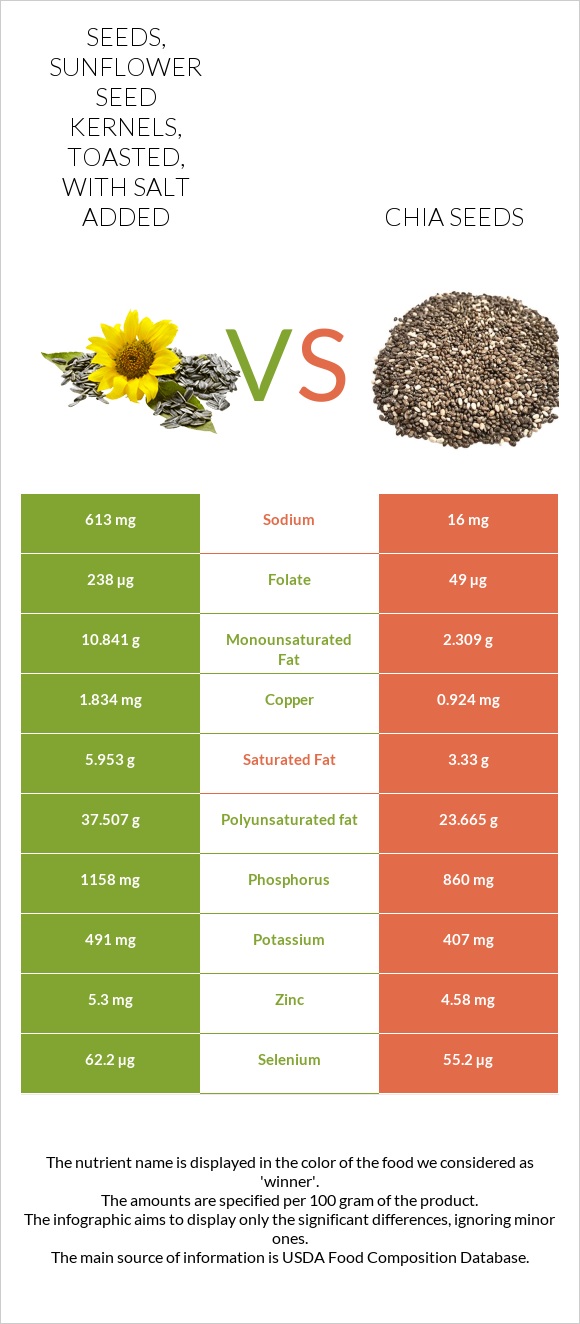Seeds, sunflower seed kernels, toasted, with salt added vs. Chia seeds — In-Depth Nutrition Comparison
Compare
A recap on the differences between seeds, sunflower seed kernels, toasted, with salt added and chia seeds
- Seeds, sunflower seed kernels, toasted, with salt added is higher in copper, folate, and phosphorus, yet chia seeds are higher in fiber, calcium, magnesium, vitamin B3, manganese, and vitamin B1.
- Seeds, sunflower seed kernels, toasted, with salt added covers your daily copper needs 101% more than chia seeds.
- Seeds, sunflower seed kernels, toasted, with salt added contains 38 times more sodium than chia seeds. While seeds, sunflower seed kernels, toasted, with salt added contains 613mg of sodium, chia seeds contain only 16mg.
Food varieties used in this article are Seeds, sunflower seed kernels, toasted, with salt added and Seeds, chia seeds, dried.
Infographic

Infographic link
Mineral Comparison
Mineral comparison score is based on the number of minerals by which one or the other food is richer. The "coverage" charts below show how much of the daily needs can be covered by 300 grams of the food.
| Contains more PotassiumPotassium | +20.6% |
| Contains more CopperCopper | +98.5% |
| Contains more ZincZinc | +15.7% |
| Contains more PhosphorusPhosphorus | +34.7% |
| Contains more SeleniumSelenium | +12.7% |
| Contains more MagnesiumMagnesium | +159.7% |
| Contains more CalciumCalcium | +1007% |
| Contains more IronIron | +13.4% |
| Contains less SodiumSodium | -97.4% |
| Contains more ManganeseManganese | +28.8% |
Vitamin Comparison
Vitamin comparison score is based on the number of vitamins by which one or the other food is richer. The "coverage" charts below show how much of the daily needs can be covered by 300 grams of the food.
| Contains more Vitamin B2Vitamin B2 | +67.6% |
| Contains more Vitamin B5Vitamin B5 | +∞% |
| Contains more Vitamin B6Vitamin B6 | +∞% |
| Contains more FolateFolate | +385.7% |
| Contains more Vitamin CVitamin C | +14.3% |
| Contains more Vitamin B1Vitamin B1 | +90.8% |
| Contains more Vitamin B3Vitamin B3 | +110.3% |
All nutrients comparison - raw data values
| Nutrient |  |
 |
DV% diff. |
| Vitamin B5 | 7.056mg | 141% | |
| Copper | 1.834mg | 0.924mg | 101% |
| Fiber | 11.5g | 34.4g | 92% |
| Polyunsaturated fat | 37.507g | 23.665g | 92% |
| Vitamin B6 | 0.805mg | 62% | |
| Calcium | 57mg | 631mg | 57% |
| Magnesium | 129mg | 335mg | 49% |
| Folate | 238µg | 49µg | 47% |
| Phosphorus | 1158mg | 860mg | 43% |
| Fats | 56.8g | 30.74g | 40% |
| Vitamin B3 | 4.198mg | 8.83mg | 29% |
| Sodium | 613mg | 16mg | 26% |
| Manganese | 2.114mg | 2.723mg | 26% |
| Vitamin B1 | 0.325mg | 0.62mg | 25% |
| Monounsaturated fat | 10.841g | 2.309g | 21% |
| Selenium | 62.2µg | 55.2µg | 13% |
| Saturated fat | 5.953g | 3.33g | 12% |
| Iron | 6.81mg | 7.72mg | 11% |
| Vitamin B2 | 0.285mg | 0.17mg | 9% |
| Calories | 619kcal | 486kcal | 7% |
| Carbs | 20.59g | 42.12g | 7% |
| Zinc | 5.3mg | 4.58mg | 7% |
| Vitamin E | 0.5mg | 3% | |
| Potassium | 491mg | 407mg | 2% |
| Protein | 17.21g | 16.54g | 1% |
| Vitamin C | 1.4mg | 1.6mg | 0% |
| Net carbs | 9.09g | 7.72g | N/A |
| Trans fat | 0.14g | N/A | |
| Tryptophan | 0.263mg | 0.436mg | 0% |
| Threonine | 0.702mg | 0.709mg | 0% |
| Isoleucine | 0.861mg | 0.801mg | 0% |
| Leucine | 1.254mg | 1.371mg | 0% |
| Lysine | 0.708mg | 0.97mg | 0% |
| Methionine | 0.374mg | 0.588mg | 0% |
| Phenylalanine | 0.883mg | 1.016mg | 0% |
| Valine | 0.994mg | 0.95mg | 0% |
| Histidine | 0.477mg | 0.531mg | 0% |
| Omega-3 - ALA | 17.83g | N/A | |
| Omega-6 - Linoleic acid | 5.835g | N/A |
Macronutrient Comparison
Macronutrient breakdown side-by-side comparison
Protein:
17.21 g
Fats:
56.8 g
Carbs:
20.59 g
Water:
1 g
Other:
4.4 g
Protein:
16.54 g
Fats:
30.74 g
Carbs:
42.12 g
Water:
5.8 g
Other:
4.8 g
| Contains more FatsFats | +84.8% |
| Contains more CarbsCarbs | +104.6% |
| Contains more WaterWater | +480% |
~equal in
Protein
~16.54g
~equal in
Other
~4.8g
Fat Type Comparison
Fat type breakdown side-by-side comparison
Saturated fat:
Sat. Fat
5.953 g
Monounsaturated fat:
Mono. Fat
10.841 g
Polyunsaturated fat:
Poly. Fat
37.507 g
Saturated fat:
Sat. Fat
3.33 g
Monounsaturated fat:
Mono. Fat
2.309 g
Polyunsaturated fat:
Poly. Fat
23.665 g
| Contains more Mono. FatMonounsaturated fat | +369.5% |
| Contains more Poly. FatPolyunsaturated fat | +58.5% |
| Contains less Sat. FatSaturated fat | -44.1% |